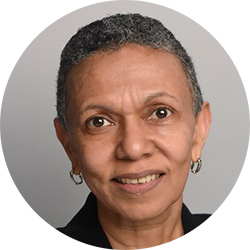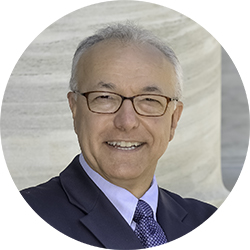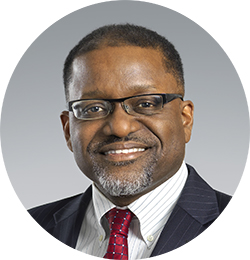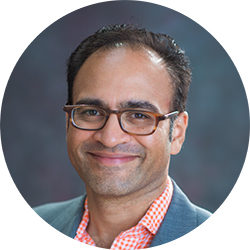
Race & Ethnicity
Conference speaker bios are below in alphabetical order.
- Tabia Akintobi
- Luisa Borrell
- George Daley
- Nwamaka Eneanya
- Marzyeh Ghassemi
- Gary Gibbons
- Isaac Kohane
- Arjun Manrai
- Ana Fernandez Oromendia
- Charlotte Owens
- Chirag Patel
- Emma Pierson
- Neil Powe
- Karthik Sivashanker
- Herman Taylor
Tabia Henry Akintobi
 Tabia Henry Akintobi, PhD, MPH, is Professor of Community Health and Preventive Medicine and Associate Dean of Community Engagement at Morehouse School of Medicine in Atlanta Georgia. She is a social behavioral scientist with a Master’s and Doctoral Degree in Public Health from the University of Miami and University of South Florida, respectively. As Principal Investigator of the Centers for Disease Control and Prevention-funded Prevention Research Center she demonstrates leadership in local, national and global community-based participatory approaches and research addressing health disparities and advancing health equity. She leads or collaborates in several initiatives that model community-driven research, including but not limited to the National Institutes of Health-funded Georgia Clinical and Translational Science Alliance, the Georgia Center for Diabetes Translational Research and The Center for Translational Research in Health Disparities. She is Community Engagement Senior Advisor for The National COVID-19 Resiliency Network (NCRN): Mitigating the Impact of COVID-19 on Vulnerable Populations, focused on health communication, rather than the COVID-19 testing strategies, specific to the proposed project. She is also the principal investigator for Georgia CEAL, that state's Community Engagement Alliance Against COVID-19 Disparities, designed to understand factors that contribute to the disproportionate burden of COVID-19 in Black and LatinX communities, through establishment of community-led research and outreach response, with a particular emphasis on vaccine communication, confidence and uptake. Her research interests, including maternal/child health, mental/behavioral health, cardiovascular health, and diabetes prevention are guided by training in public health social epidemiology, social marketing, community-based participatory research and evaluation.
Tabia Henry Akintobi, PhD, MPH, is Professor of Community Health and Preventive Medicine and Associate Dean of Community Engagement at Morehouse School of Medicine in Atlanta Georgia. She is a social behavioral scientist with a Master’s and Doctoral Degree in Public Health from the University of Miami and University of South Florida, respectively. As Principal Investigator of the Centers for Disease Control and Prevention-funded Prevention Research Center she demonstrates leadership in local, national and global community-based participatory approaches and research addressing health disparities and advancing health equity. She leads or collaborates in several initiatives that model community-driven research, including but not limited to the National Institutes of Health-funded Georgia Clinical and Translational Science Alliance, the Georgia Center for Diabetes Translational Research and The Center for Translational Research in Health Disparities. She is Community Engagement Senior Advisor for The National COVID-19 Resiliency Network (NCRN): Mitigating the Impact of COVID-19 on Vulnerable Populations, focused on health communication, rather than the COVID-19 testing strategies, specific to the proposed project. She is also the principal investigator for Georgia CEAL, that state's Community Engagement Alliance Against COVID-19 Disparities, designed to understand factors that contribute to the disproportionate burden of COVID-19 in Black and LatinX communities, through establishment of community-led research and outreach response, with a particular emphasis on vaccine communication, confidence and uptake. Her research interests, including maternal/child health, mental/behavioral health, cardiovascular health, and diabetes prevention are guided by training in public health social epidemiology, social marketing, community-based participatory research and evaluation.
Luisa Borrell
 Luisa N. Borrell, DDS, PhD, is a Distinguished Professor at the Department of Epidemiology and Biostatistics, Graduate School of Public Health and Health Policy, City University of New York (CUNY). Her research interest is on race and ethnicity, socioeconomic position, and neighborhood effects as social determinants of health. In addition, she focuses on the effect of nationality, nativity status, and race among Hispanics as social determinants of health. Dr. Borrell has expertise in research methods and the analyses of large databases, including survey, census, and spatially linked data. Finally, Dr. Borrell has an extensive record in mentoring master and doctoral students, postdoctoral fellows as well as junior faculty.
Luisa N. Borrell, DDS, PhD, is a Distinguished Professor at the Department of Epidemiology and Biostatistics, Graduate School of Public Health and Health Policy, City University of New York (CUNY). Her research interest is on race and ethnicity, socioeconomic position, and neighborhood effects as social determinants of health. In addition, she focuses on the effect of nationality, nativity status, and race among Hispanics as social determinants of health. Dr. Borrell has expertise in research methods and the analyses of large databases, including survey, census, and spatially linked data. Finally, Dr. Borrell has an extensive record in mentoring master and doctoral students, postdoctoral fellows as well as junior faculty.
George Daley

George Q. Daley, MD, PhD, is the dean of Harvard Medical School and the Caroline Shields Walker Professor of Medicine. A physician-scientist and an authority on stem cell science and cancer biology, his discoveries have twice been cited in Science magazine’s Top 10 Breakthroughs of the Year. He has co-authored international guidelines for the conduct and clinical translation of stem cell research and regenerative medicine and for ethical oversight of emerging biotechnologies. Daley’s priorities as dean of HMS include fostering innovative biomedical, computational and health care policy research, building a pipeline of novel therapeutics founded on basic science, nurturing the next generation of physician-scientists, and advancing diversity in science, technology, engineering and medicine. Daley earned his AB and MD degrees from Harvard and a PhD in biology from MIT, and has worked as a trainee, fellow and staff physician at several HMS‐affiliated hospitals.
Nwamaka Eneanya
 Dr. Nwamaka Eneanya is a clinical investigator with research interests that center on palliative care, informed decision-making, and health equity among patients with advanced chronic kidney disease and end-stage kidney disease. Her work has been supported by NIDDK, NIMHD, and the American Society of Nephrology. She is also passionate about promoting diversity within academia as well as pursuing educational and outreach opportunities through traditional and social media.
Dr. Nwamaka Eneanya is a clinical investigator with research interests that center on palliative care, informed decision-making, and health equity among patients with advanced chronic kidney disease and end-stage kidney disease. Her work has been supported by NIDDK, NIMHD, and the American Society of Nephrology. She is also passionate about promoting diversity within academia as well as pursuing educational and outreach opportunities through traditional and social media.
Marzyeh Ghassemi
 Dr. Marzyeh Ghassemi is an Assistant Professor at the University of Toronto in Computer Science and Medicine, and a Vector Institute faculty member holding a Canadian CIFAR AI Chair and Canada Research Chair. She will join MIT's IMES/EECS in July 2021.
Dr. Marzyeh Ghassemi is an Assistant Professor at the University of Toronto in Computer Science and Medicine, and a Vector Institute faculty member holding a Canadian CIFAR AI Chair and Canada Research Chair. She will join MIT's IMES/EECS in July 2021.
Professor Ghassemi currently serves as a NeurIPS 2019 Workshop Co-Chair, and General Chair for the ACM Conference on Health, Inference and Learning (CHIL). Previously, she was a Visiting Researcher with Alphabet's Verily and a post-doc with Dr. Peter Szolovits at MIT. Prior to her PhD in Computer Science at MIT, Dr. Ghassemi received an MSc degree in biomedical engineering from Oxford University as a Marshall Scholar, and BS degrees in computer science and electrical engineering as a Goldwater Scholar at New Mexico State University.
Professor Ghassemi has a well-established academic track record across computer science and clinical venues, including NeurIPS, KDD, AAAI, MLHC, JAMIA, JMIR, JMLR, AMIA-CRI, EMBC, Nature Medicine, Nature Translational Psychiatry, and Critical Care. Her work has been featured in popular press such as MIT News, The NVIDIA Blog, and Huffington Post. She was also recently named one of MIT Tech Review’s 35 Innovators Under 35.
Gary Gibbons
 Gary H. Gibbons, M.D., is Director of the National Heart, Lung, and Blood Institute (NHLBI) at the National Institutes of Health (NIH), where he oversees the third largest institute at the NIH, with an annual budget of approximately $3 billion and a staff of nearly 2,100 federal employees, contractors, and volunteers. NHLBI provides global leadership for research, training, and education programs to promote the prevention and treatment of heart, lung, and blood diseases and enhance the health of all individuals so that they can live longer and more fulfilling lives. Since being named Director of the NHLBI, Dr. Gibbons has enhanced the NHLBI investment in fundamental discovery science, steadily increasing the payline and number of awards for established and early-stage investigators. His commitment to nurturing the next generation of scientists is manifest in expanded funding for career development and loan repayment awards as well as initiatives to facilitate the transition to independent research awards. Dr. Gibbons provides leadership to advance several NIH initiatives and has made many scientific contributions in the fields of vascular biology, genomic medicine, and the pathogenesis of vascular diseases. His research focuses on investigating the relationships between clinical phenotypes, behavior, molecular interactions, and social determinants on gene expression and their contribution to cardiovascular disease. Dr. Gibbons has received several patents for innovations derived from his research in the fields of vascular biology and the pathogenesis of vascular diseases.
Gary H. Gibbons, M.D., is Director of the National Heart, Lung, and Blood Institute (NHLBI) at the National Institutes of Health (NIH), where he oversees the third largest institute at the NIH, with an annual budget of approximately $3 billion and a staff of nearly 2,100 federal employees, contractors, and volunteers. NHLBI provides global leadership for research, training, and education programs to promote the prevention and treatment of heart, lung, and blood diseases and enhance the health of all individuals so that they can live longer and more fulfilling lives. Since being named Director of the NHLBI, Dr. Gibbons has enhanced the NHLBI investment in fundamental discovery science, steadily increasing the payline and number of awards for established and early-stage investigators. His commitment to nurturing the next generation of scientists is manifest in expanded funding for career development and loan repayment awards as well as initiatives to facilitate the transition to independent research awards. Dr. Gibbons provides leadership to advance several NIH initiatives and has made many scientific contributions in the fields of vascular biology, genomic medicine, and the pathogenesis of vascular diseases. His research focuses on investigating the relationships between clinical phenotypes, behavior, molecular interactions, and social determinants on gene expression and their contribution to cardiovascular disease. Dr. Gibbons has received several patents for innovations derived from his research in the fields of vascular biology and the pathogenesis of vascular diseases.
Dr. Gibbons earned his undergraduate degree from Princeton University in Princeton, NJ, and graduated magna cum laude from Harvard Medical School in Boston. He completed his residency and cardiology fellowship at the Harvard-affiliated Brigham and Women's Hospital in Boston. Dr. Gibbons was a member of the faculty at Stanford University in Stanford, CA, from 1990-1996, and at Harvard Medical School from 1996 to 1999. He joined the Morehouse School of Medicine in Atlanta in 1999, where he served as the founding director of the Cardiovascular Research Institute, chairperson of the Department of Physiology, and professor of physiology and medicine. While at Morehouse School of Medicine, Dr. Gibbons served as a member of the National Heart, Lung, and Blood Advisory Council from 2009 to 2012.
Throughout his career, Dr. Gibbons has received numerous honors, including election to the Institute of Medicine of the National Academies of Sciences, selection as a Robert Wood Johnson Foundation Minority Faculty Development Awardee, selection as a Pew Foundation Biomedical Scholar, and recognition as an Established Investigator of the American Heart Association (AHA).
Isaac Kohane
 Isaac Kohane, MD, PhD is the inaugural Chair of the Department of Biomedical Informatics and the Marion V. Nelson Professor of Biomedical Informatics at Harvard Medical School. He develops and applies computational techniques to address disease at multiple scales—from whole healthcare systems as “living laboratories” to the functional genomics of neurodevelopment with a focus on autism. Kohane’s i2b2 project is currently deployed internationally to over 120 major academic health centers to drive discovery research in disease and pharmacovigilance (including providing evidence on drugs which ultimately contributed to a “boxed warning” by the FDA). Dr. Kohane has published several hundred papers in the medical literature and authored a widely-used book on Microarrays for an Integrative Genomics. He is a member of the Institute of Medicine and the American Society for Clinical Investigation.
Isaac Kohane, MD, PhD is the inaugural Chair of the Department of Biomedical Informatics and the Marion V. Nelson Professor of Biomedical Informatics at Harvard Medical School. He develops and applies computational techniques to address disease at multiple scales—from whole healthcare systems as “living laboratories” to the functional genomics of neurodevelopment with a focus on autism. Kohane’s i2b2 project is currently deployed internationally to over 120 major academic health centers to drive discovery research in disease and pharmacovigilance (including providing evidence on drugs which ultimately contributed to a “boxed warning” by the FDA). Dr. Kohane has published several hundred papers in the medical literature and authored a widely-used book on Microarrays for an Integrative Genomics. He is a member of the Institute of Medicine and the American Society for Clinical Investigation.
Over the last 30 years, Zak’s research agenda has been driven by the vision of what biomedical researchers could do to find new cures, provide new diagnoses and deliver the best care available if data could be converted more rapidly to knowledge and knowledge to practice. In so doing, Kohane has designed and led multiple internationally adopted efforts to “instrument” the healthcare enterprise for discovery and to enable innovative decision-making tools to be applied to the point of care. At the same time, the new insights afforded by omic-scale molecular analyses have inspired him and his collaborators to work on re-characterizing and reclassifying diseases such as autism, rheumatoid arthritis and cancers. In many of these studies, the developmental trajectories of thousands of genes have been a powerful tool in unraveling complex diseases.
Zak also currently leads four NIH-funded projects that cut across the entire agenda: 1) a Center for Excellence in Genomic Science to study neuropsychiatric disease at multiple levels, from molecular characterization of induced neurons obtained from fibroblasts of patients to automated classification of the textual component of their electronic medical record; 2) the Coordinating Center for the Undiagnosed Diseases Network, where patients with rare and unknown diseases are provided with combined clinical and molecular diagnoses in a nationally-scaled infrastructure so that they can see the right expert with all their relevant data at hand; 3) a Center for Excellence in Big Data to Knowledge to both create a nationally scaleable research data-sharing infrastructure and demonstrate its use for neurodevelopmental diseases, and 4) the Network of Enigmatic Exceptional Responders (NEER), to study those individuals who have responded seemingly miraculously to cancer treatments across a large number of cancers using the full range of measurement types, from omics to electronic health records to personal questionnaires.
Arjun Manrai
 Arjun K. Manrai, PhD, is an Assistant Professor in the Computational Health Informatics Program (CHIP) at Boston Children’s Hospital and the Department of Biomedical Informatics at Harvard Medical School. Dr. Manrai directs a research lab of machine learning scientists and clinicians working to improve medical decision making by developing computational approaches that incorporate rich and deep representations of clinical state and an individual's identity into care.
Arjun K. Manrai, PhD, is an Assistant Professor in the Computational Health Informatics Program (CHIP) at Boston Children’s Hospital and the Department of Biomedical Informatics at Harvard Medical School. Dr. Manrai directs a research lab of machine learning scientists and clinicians working to improve medical decision making by developing computational approaches that incorporate rich and deep representations of clinical state and an individual's identity into care.
Active projects in Dr. Manrai’s group include improving genetic variant classification and quantifying risk ("penetrance") in clinical genomics with a focus on inherited heart disease, disentangling demographic and clinical structure in blood laboratory biomarkers with a focus on kidney disease, developing semi and self-supervised learning methods for mining medical data, and modeling fundamental reproducibility and adoption challenges associated with the clinical deployment of artificial intelligence.
Manrai’s research has been published in the New England Journal of Medicine and JAMA, presented at the National Academy of Sciences, and featured in the New York Times, Wall Street Journal, and NPR. Students from the group have won the Rhodes, PD Soros, and other awards to continue their training and research in machine learning and medicine.
Manrai received an AB in Physics with Highest Honors from Harvard and earned his PhD in Bioinformatics and Integrative Genomics from the Harvard–MIT Division of Health Sciences and Technology under Professor Isaac Kohane.
Ana Fernandez Oromendia
 Ana Fernandez Oromendia is Senior Director of Product at Medidata Acorn AI, where she oversees product development in the evidence generation space. She is responsible for orchestrating Medidata Acorn AI’s initiatives centered on linking a patient’s data across clinical trials and the real world to better understand an individual patient’s healthcare journey.
Ana Fernandez Oromendia is Senior Director of Product at Medidata Acorn AI, where she oversees product development in the evidence generation space. She is responsible for orchestrating Medidata Acorn AI’s initiatives centered on linking a patient’s data across clinical trials and the real world to better understand an individual patient’s healthcare journey.
Born in Argentina, Oromendia has dedicated her career to developing technology that enhances scientific discovery. She has worked extensively with clinical trial data, with an emphasis on genomic data. Oromendia’s previous work focused on the impact of omics data in clinical treatment. She led the development of Medidata’s Omics analytics platform and previously worked on the development of a genetic screen for infertility conditions at Celmatix.
Oromendia is a member of the Diversity in Clinical Trials Steering Committee and Women of Color and Latino initiatives at Medidata. Her scientific work in the fields of rare disease, oncology, and fertility have been published in various journals and conferences. Oromendia has been recognized as a Rising Star by the Healthcare Businesswomen Association and has been featured as an AI Med Woman in AI. She holds a PhD in molecular genetics from the Massachusetts Institute of Technology (MIT).
Charlotte Owens
 Charlotte D. Owens, MD, FACOG, is the Vice President and Head of the Research and Development Center for Health Equity and Patient Affairs at Takeda. In her role, Dr. Owens oversees this Center of Excellence that works with a variety of Takeda teams and external partners globally to identify and address health inequities, provide early patient access to Takeda medicines, accelerate the time to diagnosis for children with rare diseases and engage patients throughout the research and development process. Immediately prior to joining Takeda, she was the Therapeutic Area Lead in U.S. Medical Affairs for Women’s Health at AbbVie, responsible for the therapeutic area’s scientific communications, field medical science liaison team, clinical trials, educational efforts, and publications.
Charlotte D. Owens, MD, FACOG, is the Vice President and Head of the Research and Development Center for Health Equity and Patient Affairs at Takeda. In her role, Dr. Owens oversees this Center of Excellence that works with a variety of Takeda teams and external partners globally to identify and address health inequities, provide early patient access to Takeda medicines, accelerate the time to diagnosis for children with rare diseases and engage patients throughout the research and development process. Immediately prior to joining Takeda, she was the Therapeutic Area Lead in U.S. Medical Affairs for Women’s Health at AbbVie, responsible for the therapeutic area’s scientific communications, field medical science liaison team, clinical trials, educational efforts, and publications.
Dr. Owens has practiced Obstetrics and Gynecology for more than 20 years, and has worked in the pharmaceutical and medical device industry for more than 12 years. Prior to joining AbbVie, she was the Chief Medical Officer for the Office of Translational Technologies, Assistant Clinical Professor of Obstetrics and Gynecology, and the Director of the Division of Industry Collaborative Research at Morehouse School of Medicine. Today, Dr. Owens serves as an Adjunct Assistant Clinical Professor of Obstetrics and Gynecology at the Morehouse School of Medicine, where she is active in the training and education of medical students and residents and patient care.
Dr. Owens is a board certified Obstetrician and Gynecologist who attended the University of California Davis where she obtained her Bachelors of Science degree in Physiology, the University of Michigan Medical School where she obtained her Doctorate in Medicine on a full scholarship, and the Henry Ford Health System where she completed her internship and residency in Obstetrics and Gynecology and was appointed Chief Resident her senior year.
Chirag Patel
 Chirag J Patel, PhD, is Associate Professor in the Department of Biomedical Informatics at Harvard Medical School (HMS). His primary research interests include developing multi-scale computational and data science methods to dissect the role of environmental exposures and genetic factors in complex traits and disease. His portfolio is supported by the National Science Foundation and the National Institutes of Health (National Institutes of Environmental Health Sciences and National Institutes of Allergy and Infectious Disease). Dr. Patel is a leader in “exposome” research, developing methods to map systems of dietary and environmental exposure factors with disease (as seen in JAMA 2015, Circulation 2012, Nature Genetics 2019, and Diabetes Care 2021) and is associate editor of Exposome (Oxford University Press). He is an active researcher in “meta-science,” studying the science of science, and is developing recommendations for healthy lifestyles and mitigating risk for chronic disease. Chirag teaches the data science course, “An Introduction to Data Science for Medical Decision Making” at Harvard Medical School. He received his PhD in biomedical informatics from Stanford University.
Chirag J Patel, PhD, is Associate Professor in the Department of Biomedical Informatics at Harvard Medical School (HMS). His primary research interests include developing multi-scale computational and data science methods to dissect the role of environmental exposures and genetic factors in complex traits and disease. His portfolio is supported by the National Science Foundation and the National Institutes of Health (National Institutes of Environmental Health Sciences and National Institutes of Allergy and Infectious Disease). Dr. Patel is a leader in “exposome” research, developing methods to map systems of dietary and environmental exposure factors with disease (as seen in JAMA 2015, Circulation 2012, Nature Genetics 2019, and Diabetes Care 2021) and is associate editor of Exposome (Oxford University Press). He is an active researcher in “meta-science,” studying the science of science, and is developing recommendations for healthy lifestyles and mitigating risk for chronic disease. Chirag teaches the data science course, “An Introduction to Data Science for Medical Decision Making” at Harvard Medical School. He received his PhD in biomedical informatics from Stanford University.
Emma Pierson
 Emma Pierson is an assistant professor of computer science at the Jacobs Technion-Cornell Institute at Cornell Tech and the Technion and a computer science field member at Cornell University, with a secondary joint appointment as an Assistant Professor of Population Health Sciences at Weill Cornell Medical College. She develops data science and machine learning methods to study inequality and healthcare. Previously, she was a senior researcher at Microsoft Research New England. Her work has been recognized by a Rhodes Scholarship, Hertz Fellowship, Rising Star in EECS, and Forbes 30 Under 30 in Science. She has written for The New York Times, FiveThirtyEight, The Atlantic, The Washington Post, Wired, and various other publications.
Emma Pierson is an assistant professor of computer science at the Jacobs Technion-Cornell Institute at Cornell Tech and the Technion and a computer science field member at Cornell University, with a secondary joint appointment as an Assistant Professor of Population Health Sciences at Weill Cornell Medical College. She develops data science and machine learning methods to study inequality and healthcare. Previously, she was a senior researcher at Microsoft Research New England. Her work has been recognized by a Rhodes Scholarship, Hertz Fellowship, Rising Star in EECS, and Forbes 30 Under 30 in Science. She has written for The New York Times, FiveThirtyEight, The Atlantic, The Washington Post, Wired, and various other publications.
Neil Powe
 Neil R. Powe, MD, MPH, MBA is the Chief of Medicine at the Priscilla Chan and Mark Zuckerberg San Francisco General Hospital and the Constance B. Wofsy Distinguished Professor and Vice-Chair of Medicine at the University of California San Francisco where he serves as administrative leader of the Department of Medicine and oversees 14 divisions, more than 700 employees engaged in clinical practice, medical education and research (>$105 million extramural funding annually) and an annual budget of approximately $150 million.
Neil R. Powe, MD, MPH, MBA is the Chief of Medicine at the Priscilla Chan and Mark Zuckerberg San Francisco General Hospital and the Constance B. Wofsy Distinguished Professor and Vice-Chair of Medicine at the University of California San Francisco where he serves as administrative leader of the Department of Medicine and oversees 14 divisions, more than 700 employees engaged in clinical practice, medical education and research (>$105 million extramural funding annually) and an annual budget of approximately $150 million.
Dr. Powe’s major interests are in improving discovery, education and clinical practice in medicine, propelling academic organizations to function effectively and efficiently, enhancing scholarship and multidisciplinary collaboration, and developing future talent and leadership in the health professions. Dr. Powe’s work unites Medicine and Public Health with the goals of saving and improving quality of human lives. His landmark investigations of outcomes in chronic kidney disease, particularly on health disparities, have influenced clinical practice and policy. He led the Choices for Healthy Outcomes in Caring for ESRD (CHOICE) study, one of the first national cohort studies of patient outcomes dialysis. He is a principal investigator of the Center for Disease Control and Prevention National CKD Surveillance System. In over 490 publications, he has studied early referral of CKD patients, patient-physician contact in dialysis care, cost-effectiveness of screening for proteinuria, race differences in cardiovascular procedure use among CKD patients, effect of treatment modalities on survival, outcomes of emergent vs standard hemodialysis for immigrants, outcomes of dialysis care by type of ownership and access to transplantation.
Dr. Powe is a member of the Institute of Medicine, the American Society of Clinical Investigation, the Association of American Physicians, the American Society of Epidemiology, Master of the American College of Physicians and Fellow in the American Association for the Advancement of Science. Among his honors are the Diversity Award from the Association of Professors of Medicine, the John M. Eisenberg Award for Career Achievement in Research from the Society of General Internal Medicine, the Distinguished Educator Award from the Association for Clinical Research Training, the Belding Scribner Award from the American Society of Nephrology, the David Hume Memorial Award from the National Kidney Foundation, the 2021 John Phillips Memorial Award for Distinguished Contributions in Clinical Medicine from the American College of Physicians and the 2021 Distinguished Alumni Award from the Association of Black Princeton Alumni. Dr. Powe earned his B.A. degree from Princeton University, medical degree at Harvard Medical School and his master’s in public health at Harvard School of Public Health. He completed residency, was a Robert Wood Johnson Clinical Scholar and completed his master’s in business administration at the University of Pennsylvania.
Prior to his role at UCSF, Dr. Powe was the James F. Fries University Distinguished Professor at the Johns Hopkins University where he directed the Welch Center for Prevention, Epidemiology and Clinical Research and the Training, Education and Career Development Programs for the Clinical and Translational Science Institute.
Karthik Sivashanker
 Dr. Karthik Sivashanker is the Vice President of Equitable Health Systems & Innovation in the Center for Health Equity at the American Medical Association, and a Medical Director in Quality, Safety, and Equity at Brigham and Women's Hospital. He's a psychiatrist at Justice Resource Institute and serves as a faculty member at the Institute for Healthcare Improvement. Dr. Sivashanker attended college and medical school at Northwestern University in Illinois. He completed psychiatry residency at NYP Weill Cornell in New York and a psychosomatic medicine fellowship at Brigham and Women's Hospital. He is a graduate of the Harvard Medical School Fellowship in Patient Safety and Quality and received a Master’s in Public Health at the Harvard School of Public Health. As a former Fulbright scholar, he conducted research in Venezuela on the vertical transmission of HIV/AIDS in rural mountain communities. As a former VA Under Secretary for Health Diffusion of Excellence Gold Fellow, he led efforts to standardize and improve the process of substance use screening and triage for Veterans. His work has focused on driving racial justice and equity in the health care arena by leveraging high-performance quality and safety practices to systematically make inequities visible and to address and resolve them as an integral part of health care delivery.
Dr. Karthik Sivashanker is the Vice President of Equitable Health Systems & Innovation in the Center for Health Equity at the American Medical Association, and a Medical Director in Quality, Safety, and Equity at Brigham and Women's Hospital. He's a psychiatrist at Justice Resource Institute and serves as a faculty member at the Institute for Healthcare Improvement. Dr. Sivashanker attended college and medical school at Northwestern University in Illinois. He completed psychiatry residency at NYP Weill Cornell in New York and a psychosomatic medicine fellowship at Brigham and Women's Hospital. He is a graduate of the Harvard Medical School Fellowship in Patient Safety and Quality and received a Master’s in Public Health at the Harvard School of Public Health. As a former Fulbright scholar, he conducted research in Venezuela on the vertical transmission of HIV/AIDS in rural mountain communities. As a former VA Under Secretary for Health Diffusion of Excellence Gold Fellow, he led efforts to standardize and improve the process of substance use screening and triage for Veterans. His work has focused on driving racial justice and equity in the health care arena by leveraging high-performance quality and safety practices to systematically make inequities visible and to address and resolve them as an integral part of health care delivery.
Herman Taylor
 Dr. Herman Taylor, MD, MPH, FACC, FAHA epidemiologist and cardiologist with an interest and expertise in CVD disparities is the current Endowed Chair and Director of the Cardiovascular Institute of the Morehouse School of Medicine. He is a graduate of Princeton University and Harvard Medical School and has been involved in the clinical practice of primary care, internal medicine, invasive and preventive cardiology over the span of his career. In addition, he has developed a substantial research career, beginning with his early contributions to the literature on coronary disease treatment disparities, in which he showed under-utilization of invasive procedures, delay in treatment and a higher frequency of mis-attribution of angina symptoms to non-cardiac etiologies among minority patients-factors contributing to poorer outcomes.
Dr. Herman Taylor, MD, MPH, FACC, FAHA epidemiologist and cardiologist with an interest and expertise in CVD disparities is the current Endowed Chair and Director of the Cardiovascular Institute of the Morehouse School of Medicine. He is a graduate of Princeton University and Harvard Medical School and has been involved in the clinical practice of primary care, internal medicine, invasive and preventive cardiology over the span of his career. In addition, he has developed a substantial research career, beginning with his early contributions to the literature on coronary disease treatment disparities, in which he showed under-utilization of invasive procedures, delay in treatment and a higher frequency of mis-attribution of angina symptoms to non-cardiac etiologies among minority patients-factors contributing to poorer outcomes.
Between 1998 and 2014, he was the inaugural director of the Jackson Heart Study. In establishing the Jackson Heart Study, Dr. Taylor guided the development of remarkable collaborations among disparate scientists and institutions, the African American community of Jackson MS, and leading NIH Institutes, thereby generating information on an understudied population, catapulting it into one of the world’s most significant repositories of information on CVD in a high-risk population and making it a hub of international scientific collaboration. Additionally, under his leadership, the study leveraged resources to enhance capacity and training opportunities for minority students, many of whom have entered the biomedical research and clinical medicine workforce with advanced understanding of key issues in health equity.
Dr. Taylor's innovative work on resilience explores cardiovascular health in the face of adverse social and biological conditions, an understudied aspect of minority health and has attracted funding from the National Science Foundation and American Heart Association. Dr. Taylor was recently elected to the National Academy of Medicine.
Conference sponsored by Takeda, Genentech, Medidata, Merck, and Pfizer.

*What do we mean by “precision medicine”? From the perspective of one of the members of the National Academy of Sciences committee that wrote the report, we mean taking an explicit multidimensional view of patients: not just one data modality such as genomics or environmental exposure. We argue that this perspective allows for more precise matching of humans to disease states (diagnosis), future disease states (prognosis) and appropriate therapies.
